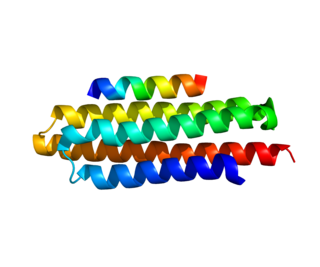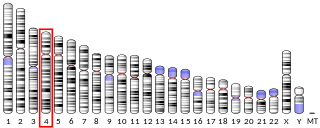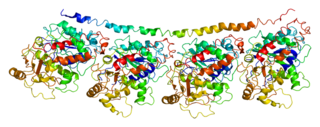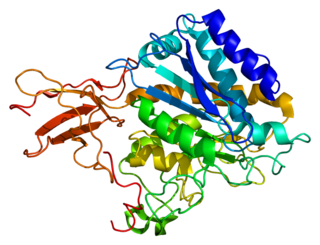Related Research Articles

Paxillin is a protein that in humans is encoded by the PXN gene. Paxillin is expressed at focal adhesions of non-striated cells and at costameres of striated muscle cells, and it functions to adhere cells to the extracellular matrix. Mutations in PXN as well as abnormal expression of paxillin protein has been implicated in the progression of various cancers.

Carboxypeptidase E (CPE), also known as carboxypeptidase H (CPH) and enkephalin convertase, is an enzyme that in humans is encoded by the CPE gene. This enzyme catalyzes the release of C-terminal arginine or lysine residues from polypeptides.

Caveolin-1 is a protein that in humans is encoded by the CAV1 gene.

Peptidyl-prolyl cis-trans isomerase FKBP1A is an enzyme that in humans is encoded by the FKBP1A gene. It is also commonly referred to as FKBP-12 or FKBP12 and is a member of a family of FK506-binding proteins (FKBPs).

C-C chemokine receptor type 1 is a protein that in humans is encoded by the CCR1 gene.

Mitogen-activated protein kinase 7 also known as MAP kinase 7 is an enzyme that in humans is encoded by the MAPK7 gene.

Phosphatidylinositol 3-kinase regulatory subunit beta is an enzyme that in humans is encoded by the PIK3R2 gene.

Tubulin alpha-4A chain is a protein that in humans is encoded by the TUBA4A gene.

Galactoside 3(4)-L-fucosyltransferase is an enzyme that in humans is encoded by the FUT3 gene.

Carboxypeptidase M is an enzyme that in humans is encoded by the CPM gene.

Carboxypeptidase D is an enzyme that in humans is encoded by the CPD gene.

Heparan sulfate glucosamine 3-O-sulfotransferase 1 is an enzyme that in humans is encoded by the HS3ST1 gene.

Carboxypeptidase Z is an enzyme that in humans is encoded by the CPZ gene.
Enkephalinases are enzymes that degrade endogenous enkephalin opioid peptides. They include:

Carboxypeptidase A6 (CPA6) is a metallocarboxypeptidase enzyme that in humans is encoded by the CPA6 gene. It is highly expressed in the adult mouse olfactory bulb and is broadly expressed in the embryonic brain and other tissues.
Leumorphin, also known as dynorphin B1–29, is a naturally occurring endogenous opioid peptide. Derived as a proteolytic cleavage product of residues 226-254 of prodynorphin, leumorphin is a nonacosapeptide and has the sequence Tyr-Gly-Gly-Phe-Leu-Arg-Arg-Gln-Phe-Lys-Val-Val-Thr-Arg-Ser-Gln-Glu-Asp-Pro-Asn-Ala-Tyr-Ser-Gly-Glu-Leu-Phe-Asp-Ala. It can be further reduced to dynorphin B and dynorphin B-14 by pitrilysin metallopeptidase 1, an enzyme of the endopeptidase family. Leumorphin behaves as a potent and selective κ-opioid receptor agonist, similarly to other endogenous opioid peptide derivatives of prodynorphin.
Cannabidiolic acid synthase is an enzyme with systematic name cannabigerolate:oxygen oxidoreductase . It is an oxidoreductase found in Cannabis sativa that catalyses the formation of cannabidiolate, a carboxylated precursor of cannabidiol.
Tubulinyl-Tyr carboxypeptidase is an enzyme. This enzyme catalyses the following chemical reaction
Carboxypeptidase D can refer to one of several enzymes. A family of serine carboxypeptidases includes is an enzyme. This enzyme has an optimal pH of 4.5-6.0, is inhibited by diisopropyl fluorophosphate, and catalyses the following chemical reaction

AE binding protein 1 is a protein that in humans is encoded by the AEBP1 gene.
References
- ↑ Kuroki K, Eng F, Ishikawa T, Turck C, Harada F, Ganem D (June 1995). "gp180, a host cell glycoprotein that binds duck hepatitis B virus particles, is encoded by a member of the carboxypeptidase gene family". The Journal of Biological Chemistry. 270 (25): 15022–8. doi: 10.1074/jbc.270.25.15022 . PMID 7797483.
- ↑ Song L, Fricker LD (October 1995). "Purification and characterization of carboxypeptidase D, a novel carboxypeptidase E-like enzyme, from bovine pituitary". The Journal of Biological Chemistry. 270 (42): 25007–13. doi: 10.1074/jbc.270.42.25007 . PMID 7559630.
- ↑ Song L, Fricker LD (November 1996). "Tissue distribution and characterization of soluble and membrane-bound forms of metallocarboxypeptidase D". The Journal of Biological Chemistry. 271 (46): 28884–9. doi:10.1074/jbc.271.46.28884. PMID 8910535.